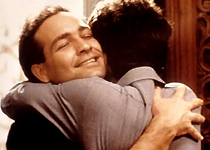For older, more cultured fags, the title Strawberry & Chocolate
will probably ring a bell. When this gay film was released in 1995,
it gained worldwide attention for its bold portrayal of a gay man's
life in the politically-repressive state of Cuba. Many critics were
impressed that the film got made at all, and that Cuba allowed it
to be distributed outside of the country. But these extraordinary
circumstances aside, the film itself is too talky by movie standards,
and its message of tolerance feels too preachy and obvious.
Set during the political repression of Communist Cuba in the 70s,
the film begins with a gay man's (Jorge Perrugoria) attempts to
seduce a handsome hetero student (Vladimor Cruz) whom he spots in
an ice-cream parlor. Jorge invites Vladimor to his home and tries
to impress the latter with his collection of mostly contraband possessions,
such as his Dostoyevsky novels and Maria Callas albums. (Back then,
such items were frowned upon by the Communist regime for being "bourgeois".)
Vladimor is initially disgusted by Jorge's homosexuality and seemingly
low morals, but he gradually comes around to understand the latter's
point of view, and learns to honor him as a friend.
Directed by Tomas Gutierrez Alea, Strawberry & Chocolate
revolves largely around the conversations between these two men.
Dramatically, it feels more like a stage play than a movie, and
the message of tolerance preached by the film feels rather contrived.
Still, Strawberry & Chocolate was bold for its time and
place. And if the Singapore censorship board passes the film (the
decision is still pending), it would the first time that it'd be
publicly screened here.
READ
Fridae Lifesytle Movie Review

